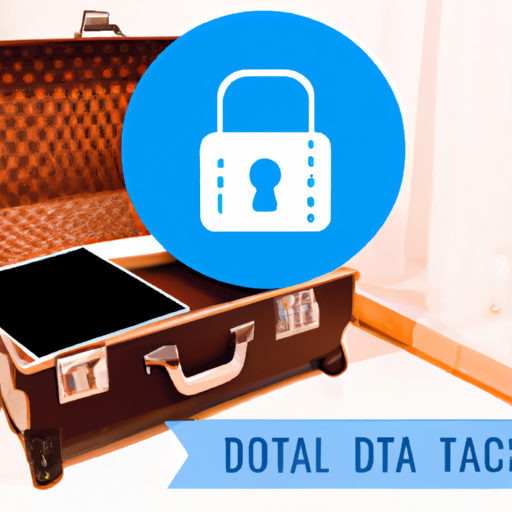In the digital age, data has become a valuable asset for businesses, including those in the hospitality industry. However, with the increasing amount of sensitive information being collected, stored, and shared, it is crucial for hospitality businesses to understand and abide by data retention compliance regulations. These regulations ensure that businesses retain and handle data in a secure and legally compliant manner. By implementing proper data retention policies and practices, hospitality businesses can safeguard the privacy of their guests and minimize the risk of legal repercussions. In this article, we will explore the importance of data retention compliance for the hospitality industry and address some frequently asked questions to help you navigate this complex area of law.
Data Retention Compliance For Hospitality
In today’s digital age, data has become a valuable asset for businesses across various industries, including the hospitality sector. From customer information to financial records, hotels and other hospitality establishments collect and store vast amounts of data on a daily basis. However, with the growing concern over data privacy and security, it is crucial for businesses in the hospitality industry to ensure compliance with data retention regulations.
The Importance of Data Retention Compliance
Data retention compliance refers to the practice of storing and managing data in accordance with legal and regulatory requirements. It is essential for businesses in the hospitality industry to comply with data retention regulations for several reasons. Firstly, compliance ensures that customer data is protected, reducing the risk of data breaches and unauthorized access. Secondly, compliance helps businesses maintain transparency and accountability in their data management practices. Finally, adherence to data retention regulations can help hospitality establishments avoid costly legal consequences and reputational damage.
Understanding Hospitality Data
Hospitality data encompasses various types of information collected by businesses in the industry. This includes personal data of guests, such as names, contact details, and payment information. Additionally, hospitality establishments also gather operational data, such as booking records, restaurant reservations, and customer feedback. Moreover, financial data, employee records, and maintenance logs are also common types of data stored by businesses in the hospitality sector.

Legal and Regulatory Framework
The legal and regulatory framework surrounding data retention compliance for hospitality businesses is complex and ever-evolving. Jurisdictions around the world have enacted laws and regulations to protect the privacy and security of personal data. In addition to country-specific regulations, hospitality establishments may also need to comply with industry-specific standards and guidelines.
Key Data Protection Regulations
One of the most prominent data protection regulations globally is the General Data Protection Regulation (GDPR) in the European Union. The GDPR sets out requirements for businesses that process personal data of EU residents, including hospitality establishments. It establishes principles for data protection, including the lawful basis for processing data, ensuring data subject rights, and implementing appropriate security measures.
Another key regulation is the California Consumer Privacy Act (CCPA) in the United States. The CCPA grants California residents certain rights regarding the personal information collected by businesses. Under the CCPA, hospitality establishments must inform customers about the categories of personal information collected and the purposes for which it is used.

Specific Data Retention Requirements for Hospitality
Data retention requirements for the hospitality industry may vary depending on the country, state, or industry guidelines. However, there are common principles that businesses should consider when defining their data retention policies. These may include:
- Data Minimization: Only collecting and retaining the necessary data that is required for business purposes.
- Consent: Ensuring that guests provide informed consent for the collection and processing of their data.
- Retention Periods: Establishing specific timeframes for retaining different types of data, considering both legal requirements and operational needs.
- Data Security: Implementing appropriate technical and organizational measures to protect the confidentiality, integrity, and availability of the data.
Key Challenges in Data Retention Compliance
While data retention compliance is crucial, it can present various challenges for businesses in the hospitality industry. One common challenge is the sheer volume of data collected, making it difficult to determine which data should be retained and for how long. Additionally, data breaches and cyber threats pose significant risks to data security, necessitating robust security measures and protocols. Furthermore, keeping up with the evolving legal and regulatory landscape can be a challenge for hospitality establishments, as regulations are subject to change.
Best Practices for Data Retention Compliance
To ensure data retention compliance, hospitality businesses can follow best practices that align with legal requirements and industry standards. Some key practices include:
- Conducting a Data Audit: Assessing the types of data collected, its storage location, and the purposes for which it is used.
- Developing Data Retention Policies: Creating comprehensive policies that outline the retention periods for different categories of data, taking into account legal requirements and operational needs.
- Implementing Data Protection Measures: Employing technical controls, such as encryption and access controls, to safeguard stored data from unauthorized access.
- Implementing Secure Data Destruction: Establishing protocols for the secure destruction of data that is no longer needed, ensuring it cannot be recovered.
- Regularly Reviewing and Updating Policies: Keeping track of changes in data protection regulations and periodically reviewing and updating data retention policies and procedures.
Implementing Data Retention Policies
Implementing data retention policies requires a collaborative effort between various stakeholders within a hospitality business. This includes management teams, IT departments, legal counsel, and privacy professionals. Collaboration ensures that policies are well-understood, effectively implemented, and consistently followed throughout the organization. Additionally, businesses should document their data retention policies and provide training to employees to ensure awareness and compliance.

Staff Training and Awareness
One of the critical elements of data retention compliance is ensuring that employees are knowledgeable about data protection regulations and the organization’s data retention policies. Staff training programs should cover topics such as data privacy, data handling procedures, and security best practices. By promoting a culture of data protection awareness, hospitality businesses can mitigate the risk of data breaches and non-compliance.
Regular Audits and Monitoring
Regular audits and monitoring are essential to ensure ongoing compliance with data retention regulations. Internal audits can help identify any potential gaps or areas of improvement in data retention practices. Businesses should also implement monitoring systems to detect and respond to any unauthorized access or data breaches promptly. By conducting periodic audits and implementing monitoring mechanisms, hospitality establishments can proactively address any compliance issues and maintain the integrity of their data management practices.
Conclusion
In conclusion, data retention compliance is of utmost importance for businesses in the hospitality industry. By understanding the legal and regulatory framework, implementing best practices, and maintaining staff training and awareness, hospitality businesses can safeguard their data, protect customer privacy, and avoid legal consequences. Implementing comprehensive data retention policies and conducting regular audits and monitoring are crucial steps towards achieving compliance. Remember, compliance is an ongoing process that requires continuous adaptation to evolving legal requirements and technological advancements in the data protection landscape.
Frequently Asked Questions:
Q: How long should hospitality businesses retain customer data?
A: The retention period for customer data may vary depending on the legal requirements of the jurisdiction in which the business operates. However, it is advisable for hospitality businesses to establish clear policies outlining the retention periods for different categories of data, considering both legal requirements and operational needs.
Q: What are the consequences of non-compliance with data retention regulations?
A: Non-compliance with data retention regulations can result in severe consequences for hospitality businesses, including fines, legal actions, reputational damage, and loss of customer trust. It is essential for businesses to prioritize data retention compliance to mitigate these risks.
Q: Can hospitality businesses store data in the cloud?
A: Yes, hospitality businesses can store data in the cloud, but they must ensure that appropriate security measures are in place to protect the data from unauthorized access or breaches. It is crucial to select reputable cloud service providers that comply with data protection regulations and offer robust security measures.
Q: What steps can hospitality businesses take to enhance data security?
A: Hospitality businesses can enhance data security by implementing measures such as encryption, access controls, regular data backups, and staff training on data handling best practices. It is also important to regularly update software and systems to address any identified vulnerabilities.
Q: Are there international standards for data retention compliance in the hospitality industry?
A: While there are no specific international standards for data retention compliance in the hospitality industry, businesses should adhere to relevant national and regional data protection regulations, such as the GDPR in the European Union or the CCPA in the United States, depending on the jurisdiction in which they operate.
